Legal Aspects of Business: Agency Relationships, Authority, and Cases
VerifiedAdded on 2023/01/18
|12
|3273
|68
Report
AI Summary
This report provides an in-depth analysis of the legal aspects of agency relationships in business. It begins with an introduction to agency, defining the relationship between principals and agents, and highlighting the relevance of agency theory in business. The report then delves into the concept of agency authority, differentiating between actual and apparent authority, and exploring express and implied authority. It discusses the fiduciary duties that agents owe to their principals. The report also examines the different types of agency relationships, including principal-agent, agent-third party, and principal-third party relationships. It further explores different kinds of agent authority like general, special, and agent coupled with interest. The report includes a detailed discussion of apparent or ostensible authority and concludes with a case study, Rama Corporation v/s proved tin and general investment, and another case Freeman and lockyer v/s Buckhurst park properties Ltd to illustrate key concepts.
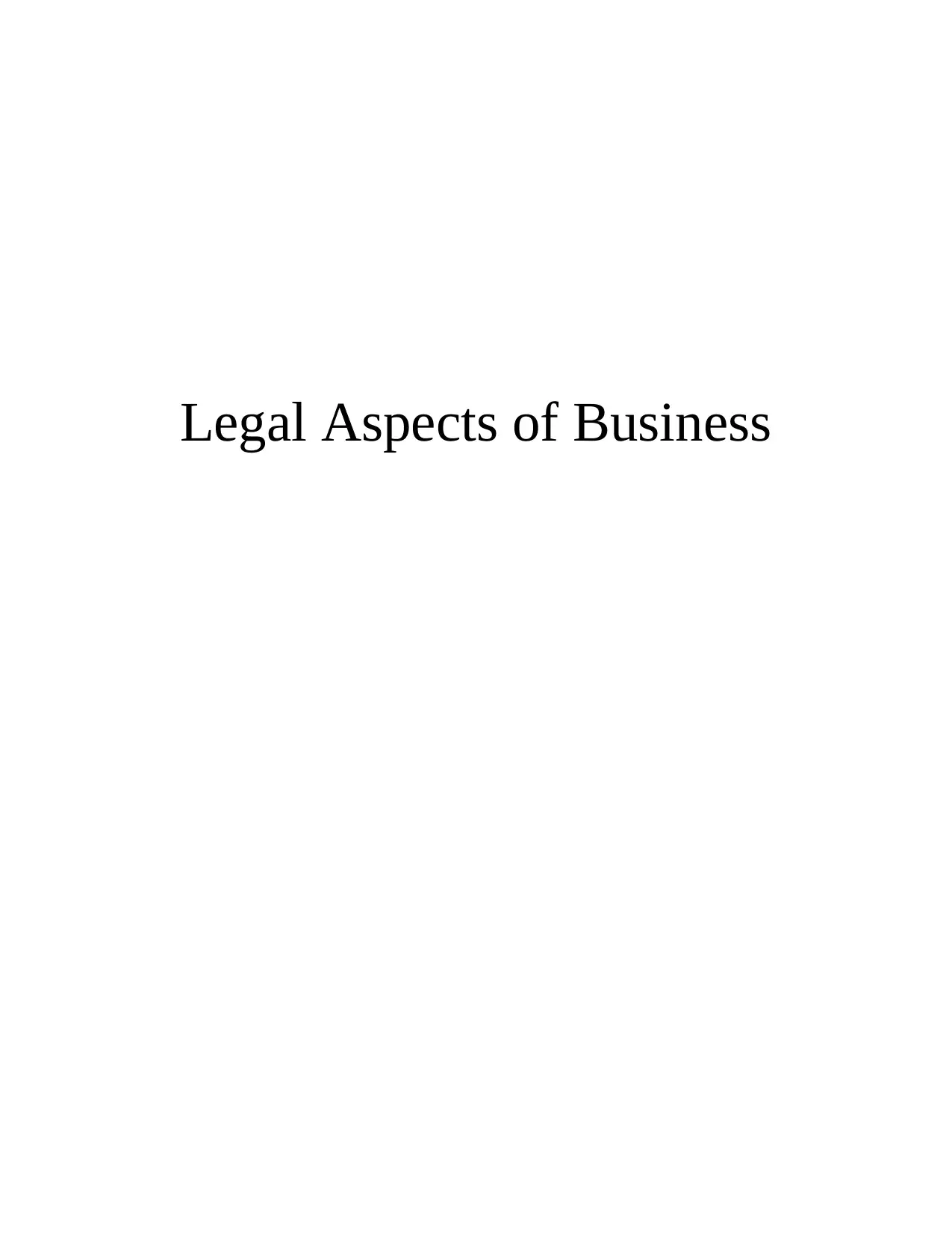
Legal Aspects of Business
Paraphrase This Document
Need a fresh take? Get an instant paraphrase of this document with our AI Paraphraser

TABLE OF CONTENTS
INTRODUCTION...........................................................................................................................1
CONCLUSION................................................................................................................................7
REFERENCES................................................................................................................................8
INTRODUCTION...........................................................................................................................1
CONCLUSION................................................................................................................................7
REFERENCES................................................................................................................................8
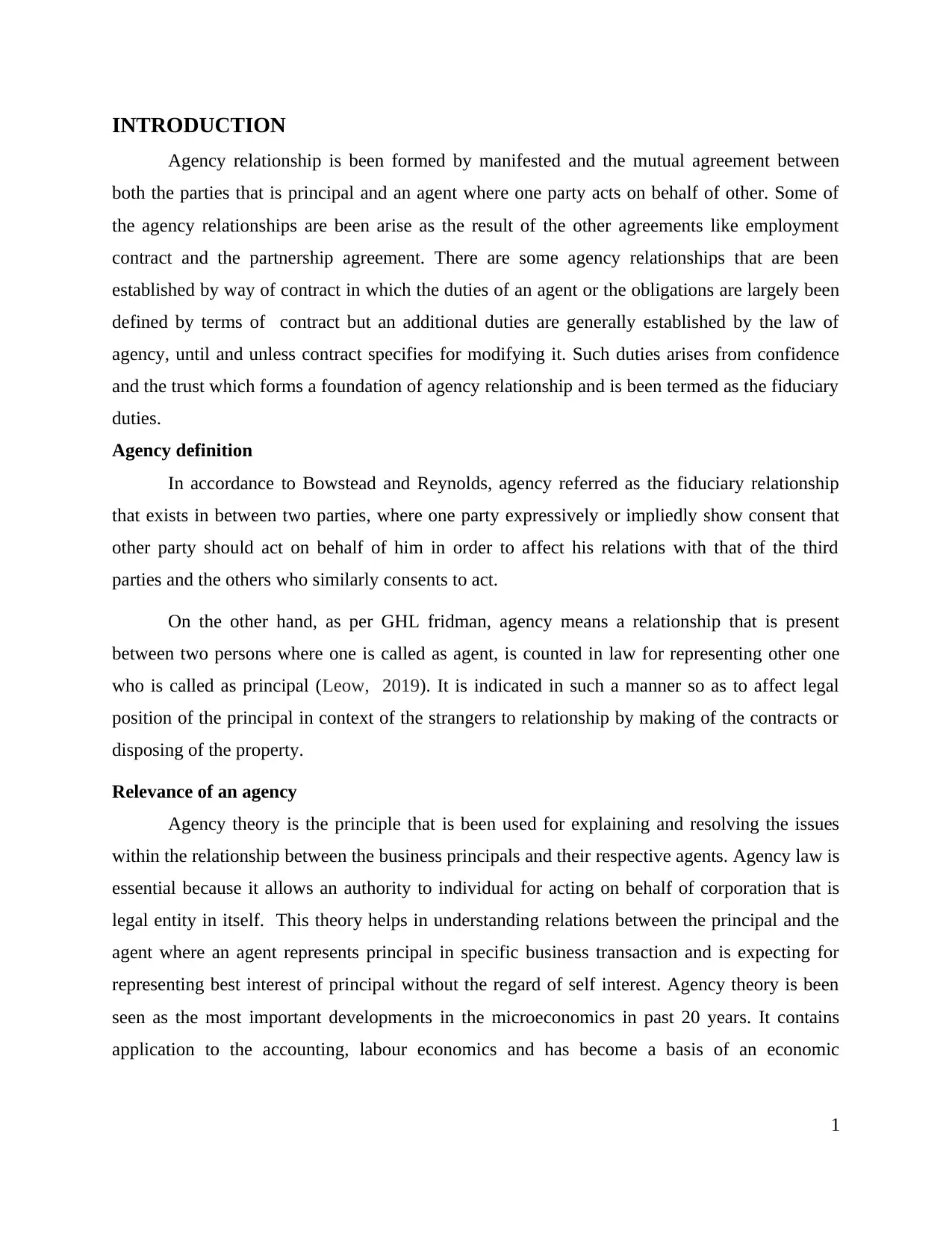
INTRODUCTION
Agency relationship is been formed by manifested and the mutual agreement between
both the parties that is principal and an agent where one party acts on behalf of other. Some of
the agency relationships are been arise as the result of the other agreements like employment
contract and the partnership agreement. There are some agency relationships that are been
established by way of contract in which the duties of an agent or the obligations are largely been
defined by terms of contract but an additional duties are generally established by the law of
agency, until and unless contract specifies for modifying it. Such duties arises from confidence
and the trust which forms a foundation of agency relationship and is been termed as the fiduciary
duties.
Agency definition
In accordance to Bowstead and Reynolds, agency referred as the fiduciary relationship
that exists in between two parties, where one party expressively or impliedly show consent that
other party should act on behalf of him in order to affect his relations with that of the third
parties and the others who similarly consents to act.
On the other hand, as per GHL fridman, agency means a relationship that is present
between two persons where one is called as agent, is counted in law for representing other one
who is called as principal (Leow, 2019). It is indicated in such a manner so as to affect legal
position of the principal in context of the strangers to relationship by making of the contracts or
disposing of the property.
Relevance of an agency
Agency theory is the principle that is been used for explaining and resolving the issues
within the relationship between the business principals and their respective agents. Agency law is
essential because it allows an authority to individual for acting on behalf of corporation that is
legal entity in itself. This theory helps in understanding relations between the principal and the
agent where an agent represents principal in specific business transaction and is expecting for
representing best interest of principal without the regard of self interest. Agency theory is been
seen as the most important developments in the microeconomics in past 20 years. It contains
application to the accounting, labour economics and has become a basis of an economic
1
Agency relationship is been formed by manifested and the mutual agreement between
both the parties that is principal and an agent where one party acts on behalf of other. Some of
the agency relationships are been arise as the result of the other agreements like employment
contract and the partnership agreement. There are some agency relationships that are been
established by way of contract in which the duties of an agent or the obligations are largely been
defined by terms of contract but an additional duties are generally established by the law of
agency, until and unless contract specifies for modifying it. Such duties arises from confidence
and the trust which forms a foundation of agency relationship and is been termed as the fiduciary
duties.
Agency definition
In accordance to Bowstead and Reynolds, agency referred as the fiduciary relationship
that exists in between two parties, where one party expressively or impliedly show consent that
other party should act on behalf of him in order to affect his relations with that of the third
parties and the others who similarly consents to act.
On the other hand, as per GHL fridman, agency means a relationship that is present
between two persons where one is called as agent, is counted in law for representing other one
who is called as principal (Leow, 2019). It is indicated in such a manner so as to affect legal
position of the principal in context of the strangers to relationship by making of the contracts or
disposing of the property.
Relevance of an agency
Agency theory is the principle that is been used for explaining and resolving the issues
within the relationship between the business principals and their respective agents. Agency law is
essential because it allows an authority to individual for acting on behalf of corporation that is
legal entity in itself. This theory helps in understanding relations between the principal and the
agent where an agent represents principal in specific business transaction and is expecting for
representing best interest of principal without the regard of self interest. Agency theory is been
seen as the most important developments in the microeconomics in past 20 years. It contains
application to the accounting, labour economics and has become a basis of an economic
1
⊘ This is a preview!⊘
Do you want full access?
Subscribe today to unlock all pages.

Trusted by 1+ million students worldwide
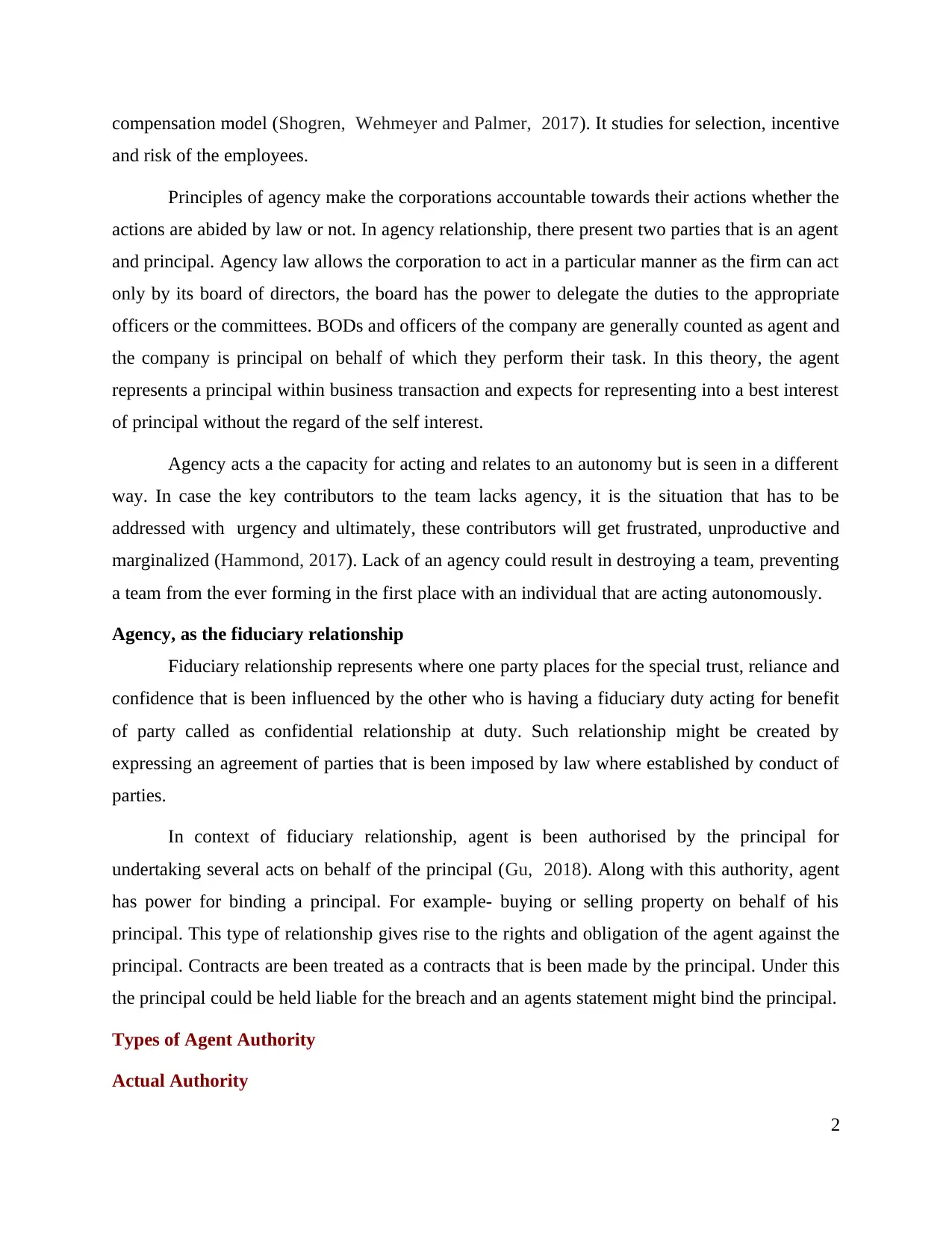
compensation model (Shogren, Wehmeyer and Palmer, 2017). It studies for selection, incentive
and risk of the employees.
Principles of agency make the corporations accountable towards their actions whether the
actions are abided by law or not. In agency relationship, there present two parties that is an agent
and principal. Agency law allows the corporation to act in a particular manner as the firm can act
only by its board of directors, the board has the power to delegate the duties to the appropriate
officers or the committees. BODs and officers of the company are generally counted as agent and
the company is principal on behalf of which they perform their task. In this theory, the agent
represents a principal within business transaction and expects for representing into a best interest
of principal without the regard of the self interest.
Agency acts a the capacity for acting and relates to an autonomy but is seen in a different
way. In case the key contributors to the team lacks agency, it is the situation that has to be
addressed with urgency and ultimately, these contributors will get frustrated, unproductive and
marginalized (Hammond, 2017). Lack of an agency could result in destroying a team, preventing
a team from the ever forming in the first place with an individual that are acting autonomously.
Agency, as the fiduciary relationship
Fiduciary relationship represents where one party places for the special trust, reliance and
confidence that is been influenced by the other who is having a fiduciary duty acting for benefit
of party called as confidential relationship at duty. Such relationship might be created by
expressing an agreement of parties that is been imposed by law where established by conduct of
parties.
In context of fiduciary relationship, agent is been authorised by the principal for
undertaking several acts on behalf of the principal (Gu, 2018). Along with this authority, agent
has power for binding a principal. For example- buying or selling property on behalf of his
principal. This type of relationship gives rise to the rights and obligation of the agent against the
principal. Contracts are been treated as a contracts that is been made by the principal. Under this
the principal could be held liable for the breach and an agents statement might bind the principal.
Types of Agent Authority
Actual Authority
2
and risk of the employees.
Principles of agency make the corporations accountable towards their actions whether the
actions are abided by law or not. In agency relationship, there present two parties that is an agent
and principal. Agency law allows the corporation to act in a particular manner as the firm can act
only by its board of directors, the board has the power to delegate the duties to the appropriate
officers or the committees. BODs and officers of the company are generally counted as agent and
the company is principal on behalf of which they perform their task. In this theory, the agent
represents a principal within business transaction and expects for representing into a best interest
of principal without the regard of the self interest.
Agency acts a the capacity for acting and relates to an autonomy but is seen in a different
way. In case the key contributors to the team lacks agency, it is the situation that has to be
addressed with urgency and ultimately, these contributors will get frustrated, unproductive and
marginalized (Hammond, 2017). Lack of an agency could result in destroying a team, preventing
a team from the ever forming in the first place with an individual that are acting autonomously.
Agency, as the fiduciary relationship
Fiduciary relationship represents where one party places for the special trust, reliance and
confidence that is been influenced by the other who is having a fiduciary duty acting for benefit
of party called as confidential relationship at duty. Such relationship might be created by
expressing an agreement of parties that is been imposed by law where established by conduct of
parties.
In context of fiduciary relationship, agent is been authorised by the principal for
undertaking several acts on behalf of the principal (Gu, 2018). Along with this authority, agent
has power for binding a principal. For example- buying or selling property on behalf of his
principal. This type of relationship gives rise to the rights and obligation of the agent against the
principal. Contracts are been treated as a contracts that is been made by the principal. Under this
the principal could be held liable for the breach and an agents statement might bind the principal.
Types of Agent Authority
Actual Authority
2
Paraphrase This Document
Need a fresh take? Get an instant paraphrase of this document with our AI Paraphraser
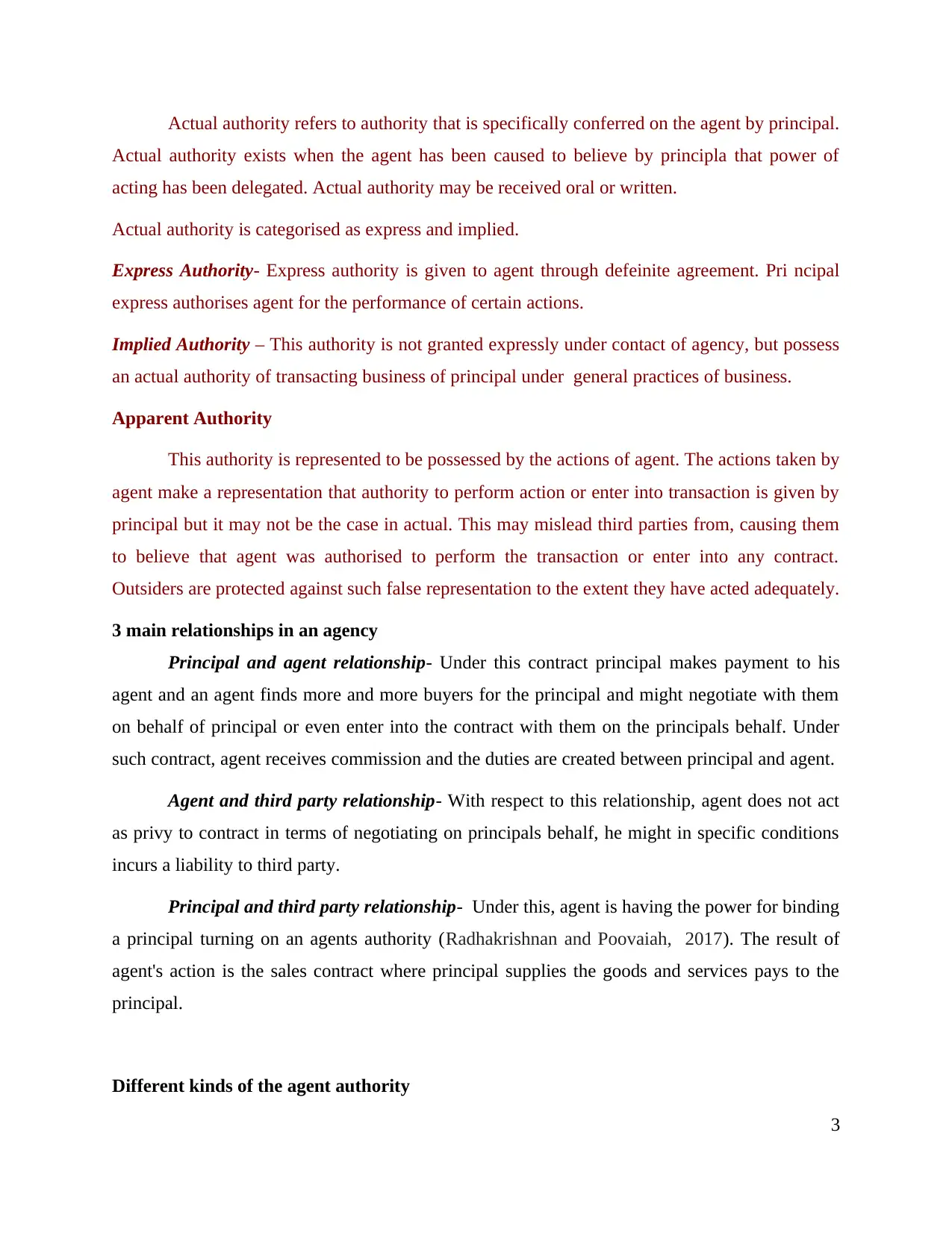
Actual authority refers to authority that is specifically conferred on the agent by principal.
Actual authority exists when the agent has been caused to believe by principla that power of
acting has been delegated. Actual authority may be received oral or written.
Actual authority is categorised as express and implied.
Express Authority- Express authority is given to agent through defeinite agreement. Pri ncipal
express authorises agent for the performance of certain actions.
Implied Authority – This authority is not granted expressly under contact of agency, but possess
an actual authority of transacting business of principal under general practices of business.
Apparent Authority
This authority is represented to be possessed by the actions of agent. The actions taken by
agent make a representation that authority to perform action or enter into transaction is given by
principal but it may not be the case in actual. This may mislead third parties from, causing them
to believe that agent was authorised to perform the transaction or enter into any contract.
Outsiders are protected against such false representation to the extent they have acted adequately.
3 main relationships in an agency
Principal and agent relationship- Under this contract principal makes payment to his
agent and an agent finds more and more buyers for the principal and might negotiate with them
on behalf of principal or even enter into the contract with them on the principals behalf. Under
such contract, agent receives commission and the duties are created between principal and agent.
Agent and third party relationship- With respect to this relationship, agent does not act
as privy to contract in terms of negotiating on principals behalf, he might in specific conditions
incurs a liability to third party.
Principal and third party relationship- Under this, agent is having the power for binding
a principal turning on an agents authority (Radhakrishnan and Poovaiah, 2017). The result of
agent's action is the sales contract where principal supplies the goods and services pays to the
principal.
Different kinds of the agent authority
3
Actual authority exists when the agent has been caused to believe by principla that power of
acting has been delegated. Actual authority may be received oral or written.
Actual authority is categorised as express and implied.
Express Authority- Express authority is given to agent through defeinite agreement. Pri ncipal
express authorises agent for the performance of certain actions.
Implied Authority – This authority is not granted expressly under contact of agency, but possess
an actual authority of transacting business of principal under general practices of business.
Apparent Authority
This authority is represented to be possessed by the actions of agent. The actions taken by
agent make a representation that authority to perform action or enter into transaction is given by
principal but it may not be the case in actual. This may mislead third parties from, causing them
to believe that agent was authorised to perform the transaction or enter into any contract.
Outsiders are protected against such false representation to the extent they have acted adequately.
3 main relationships in an agency
Principal and agent relationship- Under this contract principal makes payment to his
agent and an agent finds more and more buyers for the principal and might negotiate with them
on behalf of principal or even enter into the contract with them on the principals behalf. Under
such contract, agent receives commission and the duties are created between principal and agent.
Agent and third party relationship- With respect to this relationship, agent does not act
as privy to contract in terms of negotiating on principals behalf, he might in specific conditions
incurs a liability to third party.
Principal and third party relationship- Under this, agent is having the power for binding
a principal turning on an agents authority (Radhakrishnan and Poovaiah, 2017). The result of
agent's action is the sales contract where principal supplies the goods and services pays to the
principal.
Different kinds of the agent authority
3
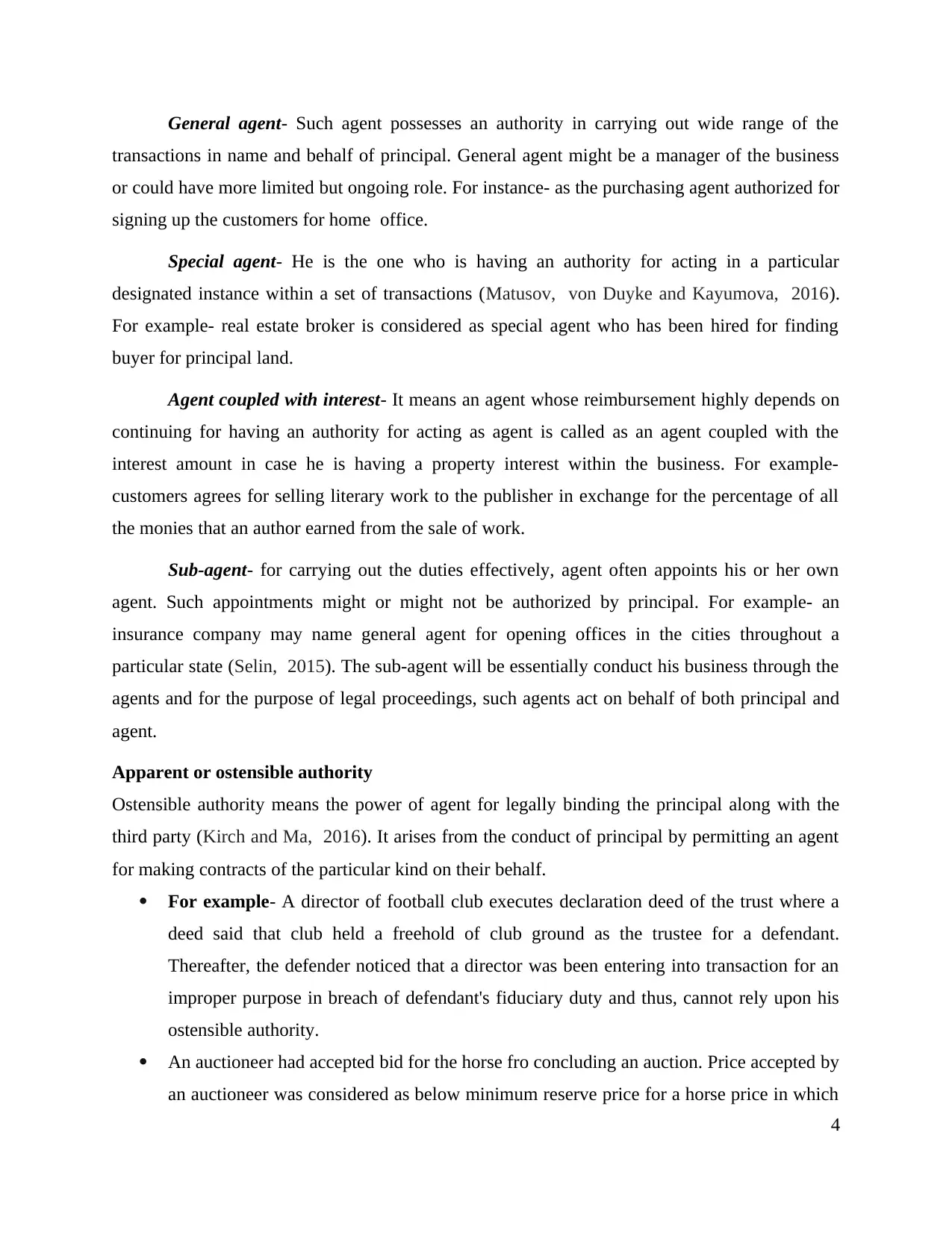
General agent- Such agent possesses an authority in carrying out wide range of the
transactions in name and behalf of principal. General agent might be a manager of the business
or could have more limited but ongoing role. For instance- as the purchasing agent authorized for
signing up the customers for home office.
Special agent- He is the one who is having an authority for acting in a particular
designated instance within a set of transactions (Matusov, von Duyke and Kayumova, 2016).
For example- real estate broker is considered as special agent who has been hired for finding
buyer for principal land.
Agent coupled with interest- It means an agent whose reimbursement highly depends on
continuing for having an authority for acting as agent is called as an agent coupled with the
interest amount in case he is having a property interest within the business. For example-
customers agrees for selling literary work to the publisher in exchange for the percentage of all
the monies that an author earned from the sale of work.
Sub-agent- for carrying out the duties effectively, agent often appoints his or her own
agent. Such appointments might or might not be authorized by principal. For example- an
insurance company may name general agent for opening offices in the cities throughout a
particular state (Selin, 2015). The sub-agent will be essentially conduct his business through the
agents and for the purpose of legal proceedings, such agents act on behalf of both principal and
agent.
Apparent or ostensible authority
Ostensible authority means the power of agent for legally binding the principal along with the
third party (Kirch and Ma, 2016). It arises from the conduct of principal by permitting an agent
for making contracts of the particular kind on their behalf.
For example- A director of football club executes declaration deed of the trust where a
deed said that club held a freehold of club ground as the trustee for a defendant.
Thereafter, the defender noticed that a director was been entering into transaction for an
improper purpose in breach of defendant's fiduciary duty and thus, cannot rely upon his
ostensible authority.
An auctioneer had accepted bid for the horse fro concluding an auction. Price accepted by
an auctioneer was considered as below minimum reserve price for a horse price in which
4
transactions in name and behalf of principal. General agent might be a manager of the business
or could have more limited but ongoing role. For instance- as the purchasing agent authorized for
signing up the customers for home office.
Special agent- He is the one who is having an authority for acting in a particular
designated instance within a set of transactions (Matusov, von Duyke and Kayumova, 2016).
For example- real estate broker is considered as special agent who has been hired for finding
buyer for principal land.
Agent coupled with interest- It means an agent whose reimbursement highly depends on
continuing for having an authority for acting as agent is called as an agent coupled with the
interest amount in case he is having a property interest within the business. For example-
customers agrees for selling literary work to the publisher in exchange for the percentage of all
the monies that an author earned from the sale of work.
Sub-agent- for carrying out the duties effectively, agent often appoints his or her own
agent. Such appointments might or might not be authorized by principal. For example- an
insurance company may name general agent for opening offices in the cities throughout a
particular state (Selin, 2015). The sub-agent will be essentially conduct his business through the
agents and for the purpose of legal proceedings, such agents act on behalf of both principal and
agent.
Apparent or ostensible authority
Ostensible authority means the power of agent for legally binding the principal along with the
third party (Kirch and Ma, 2016). It arises from the conduct of principal by permitting an agent
for making contracts of the particular kind on their behalf.
For example- A director of football club executes declaration deed of the trust where a
deed said that club held a freehold of club ground as the trustee for a defendant.
Thereafter, the defender noticed that a director was been entering into transaction for an
improper purpose in breach of defendant's fiduciary duty and thus, cannot rely upon his
ostensible authority.
An auctioneer had accepted bid for the horse fro concluding an auction. Price accepted by
an auctioneer was considered as below minimum reserve price for a horse price in which
4
⊘ This is a preview!⊘
Do you want full access?
Subscribe today to unlock all pages.

Trusted by 1+ million students worldwide
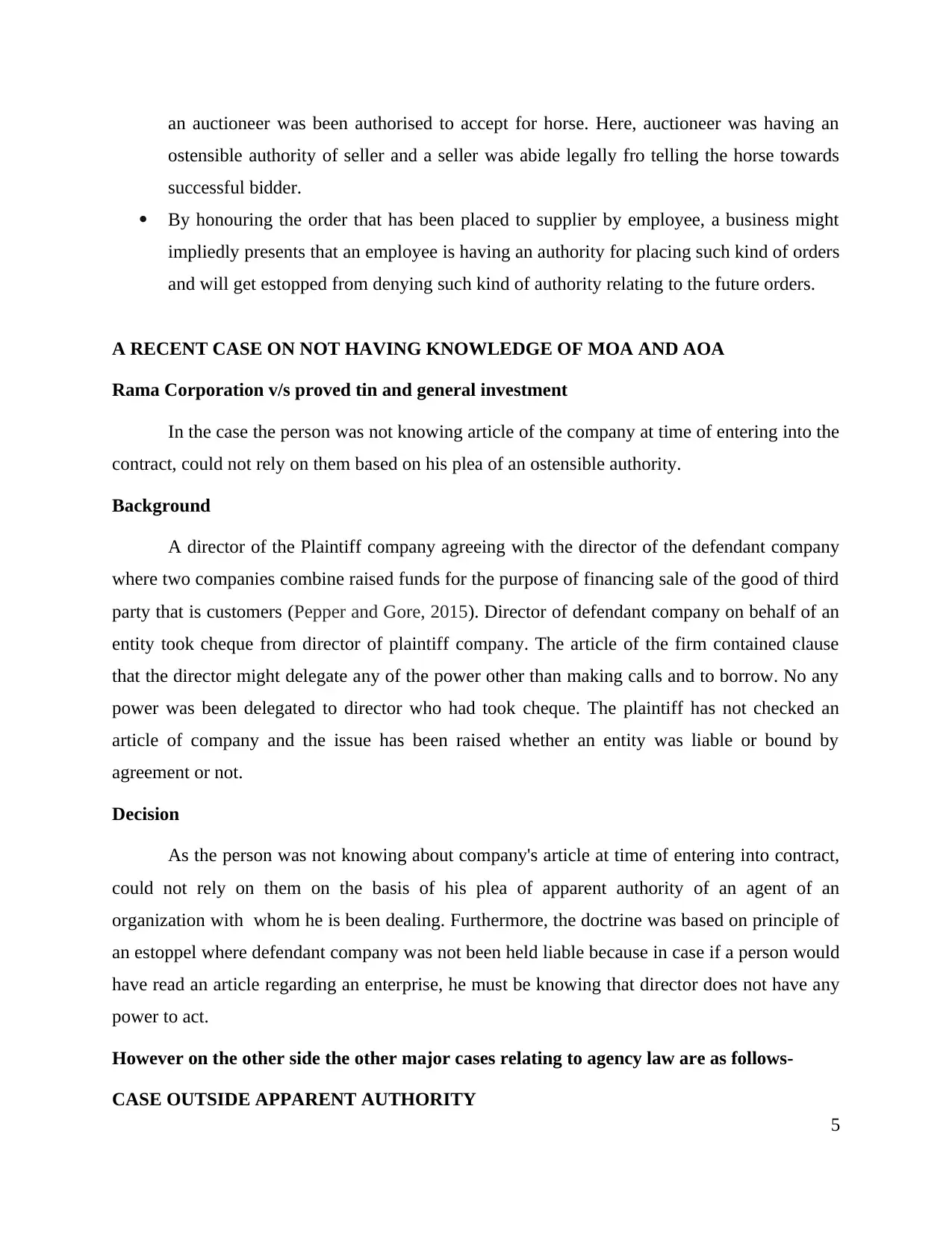
an auctioneer was been authorised to accept for horse. Here, auctioneer was having an
ostensible authority of seller and a seller was abide legally fro telling the horse towards
successful bidder.
By honouring the order that has been placed to supplier by employee, a business might
impliedly presents that an employee is having an authority for placing such kind of orders
and will get estopped from denying such kind of authority relating to the future orders.
A RECENT CASE ON NOT HAVING KNOWLEDGE OF MOA AND AOA
Rama Corporation v/s proved tin and general investment
In the case the person was not knowing article of the company at time of entering into the
contract, could not rely on them based on his plea of an ostensible authority.
Background
A director of the Plaintiff company agreeing with the director of the defendant company
where two companies combine raised funds for the purpose of financing sale of the good of third
party that is customers (Pepper and Gore, 2015). Director of defendant company on behalf of an
entity took cheque from director of plaintiff company. The article of the firm contained clause
that the director might delegate any of the power other than making calls and to borrow. No any
power was been delegated to director who had took cheque. The plaintiff has not checked an
article of company and the issue has been raised whether an entity was liable or bound by
agreement or not.
Decision
As the person was not knowing about company's article at time of entering into contract,
could not rely on them on the basis of his plea of apparent authority of an agent of an
organization with whom he is been dealing. Furthermore, the doctrine was based on principle of
an estoppel where defendant company was not been held liable because in case if a person would
have read an article regarding an enterprise, he must be knowing that director does not have any
power to act.
However on the other side the other major cases relating to agency law are as follows-
CASE OUTSIDE APPARENT AUTHORITY
5
ostensible authority of seller and a seller was abide legally fro telling the horse towards
successful bidder.
By honouring the order that has been placed to supplier by employee, a business might
impliedly presents that an employee is having an authority for placing such kind of orders
and will get estopped from denying such kind of authority relating to the future orders.
A RECENT CASE ON NOT HAVING KNOWLEDGE OF MOA AND AOA
Rama Corporation v/s proved tin and general investment
In the case the person was not knowing article of the company at time of entering into the
contract, could not rely on them based on his plea of an ostensible authority.
Background
A director of the Plaintiff company agreeing with the director of the defendant company
where two companies combine raised funds for the purpose of financing sale of the good of third
party that is customers (Pepper and Gore, 2015). Director of defendant company on behalf of an
entity took cheque from director of plaintiff company. The article of the firm contained clause
that the director might delegate any of the power other than making calls and to borrow. No any
power was been delegated to director who had took cheque. The plaintiff has not checked an
article of company and the issue has been raised whether an entity was liable or bound by
agreement or not.
Decision
As the person was not knowing about company's article at time of entering into contract,
could not rely on them on the basis of his plea of apparent authority of an agent of an
organization with whom he is been dealing. Furthermore, the doctrine was based on principle of
an estoppel where defendant company was not been held liable because in case if a person would
have read an article regarding an enterprise, he must be knowing that director does not have any
power to act.
However on the other side the other major cases relating to agency law are as follows-
CASE OUTSIDE APPARENT AUTHORITY
5
Paraphrase This Document
Need a fresh take? Get an instant paraphrase of this document with our AI Paraphraser
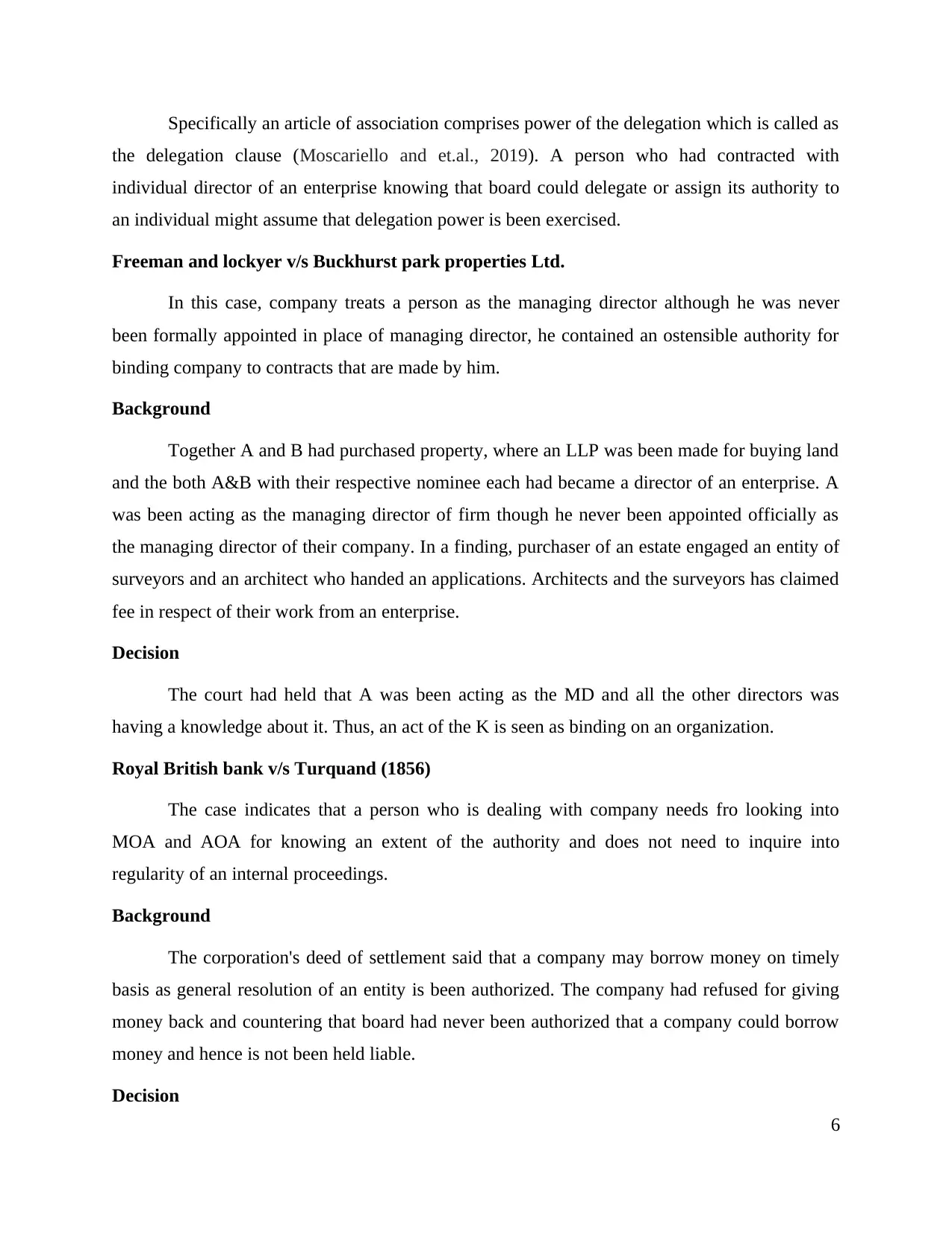
Specifically an article of association comprises power of the delegation which is called as
the delegation clause (Moscariello and et.al., 2019). A person who had contracted with
individual director of an enterprise knowing that board could delegate or assign its authority to
an individual might assume that delegation power is been exercised.
Freeman and lockyer v/s Buckhurst park properties Ltd.
In this case, company treats a person as the managing director although he was never
been formally appointed in place of managing director, he contained an ostensible authority for
binding company to contracts that are made by him.
Background
Together A and B had purchased property, where an LLP was been made for buying land
and the both A&B with their respective nominee each had became a director of an enterprise. A
was been acting as the managing director of firm though he never been appointed officially as
the managing director of their company. In a finding, purchaser of an estate engaged an entity of
surveyors and an architect who handed an applications. Architects and the surveyors has claimed
fee in respect of their work from an enterprise.
Decision
The court had held that A was been acting as the MD and all the other directors was
having a knowledge about it. Thus, an act of the K is seen as binding on an organization.
Royal British bank v/s Turquand (1856)
The case indicates that a person who is dealing with company needs fro looking into
MOA and AOA for knowing an extent of the authority and does not need to inquire into
regularity of an internal proceedings.
Background
The corporation's deed of settlement said that a company may borrow money on timely
basis as general resolution of an entity is been authorized. The company had refused for giving
money back and countering that board had never been authorized that a company could borrow
money and hence is not been held liable.
Decision
6
the delegation clause (Moscariello and et.al., 2019). A person who had contracted with
individual director of an enterprise knowing that board could delegate or assign its authority to
an individual might assume that delegation power is been exercised.
Freeman and lockyer v/s Buckhurst park properties Ltd.
In this case, company treats a person as the managing director although he was never
been formally appointed in place of managing director, he contained an ostensible authority for
binding company to contracts that are made by him.
Background
Together A and B had purchased property, where an LLP was been made for buying land
and the both A&B with their respective nominee each had became a director of an enterprise. A
was been acting as the managing director of firm though he never been appointed officially as
the managing director of their company. In a finding, purchaser of an estate engaged an entity of
surveyors and an architect who handed an applications. Architects and the surveyors has claimed
fee in respect of their work from an enterprise.
Decision
The court had held that A was been acting as the MD and all the other directors was
having a knowledge about it. Thus, an act of the K is seen as binding on an organization.
Royal British bank v/s Turquand (1856)
The case indicates that a person who is dealing with company needs fro looking into
MOA and AOA for knowing an extent of the authority and does not need to inquire into
regularity of an internal proceedings.
Background
The corporation's deed of settlement said that a company may borrow money on timely
basis as general resolution of an entity is been authorized. The company had refused for giving
money back and countering that board had never been authorized that a company could borrow
money and hence is not been held liable.
Decision
6
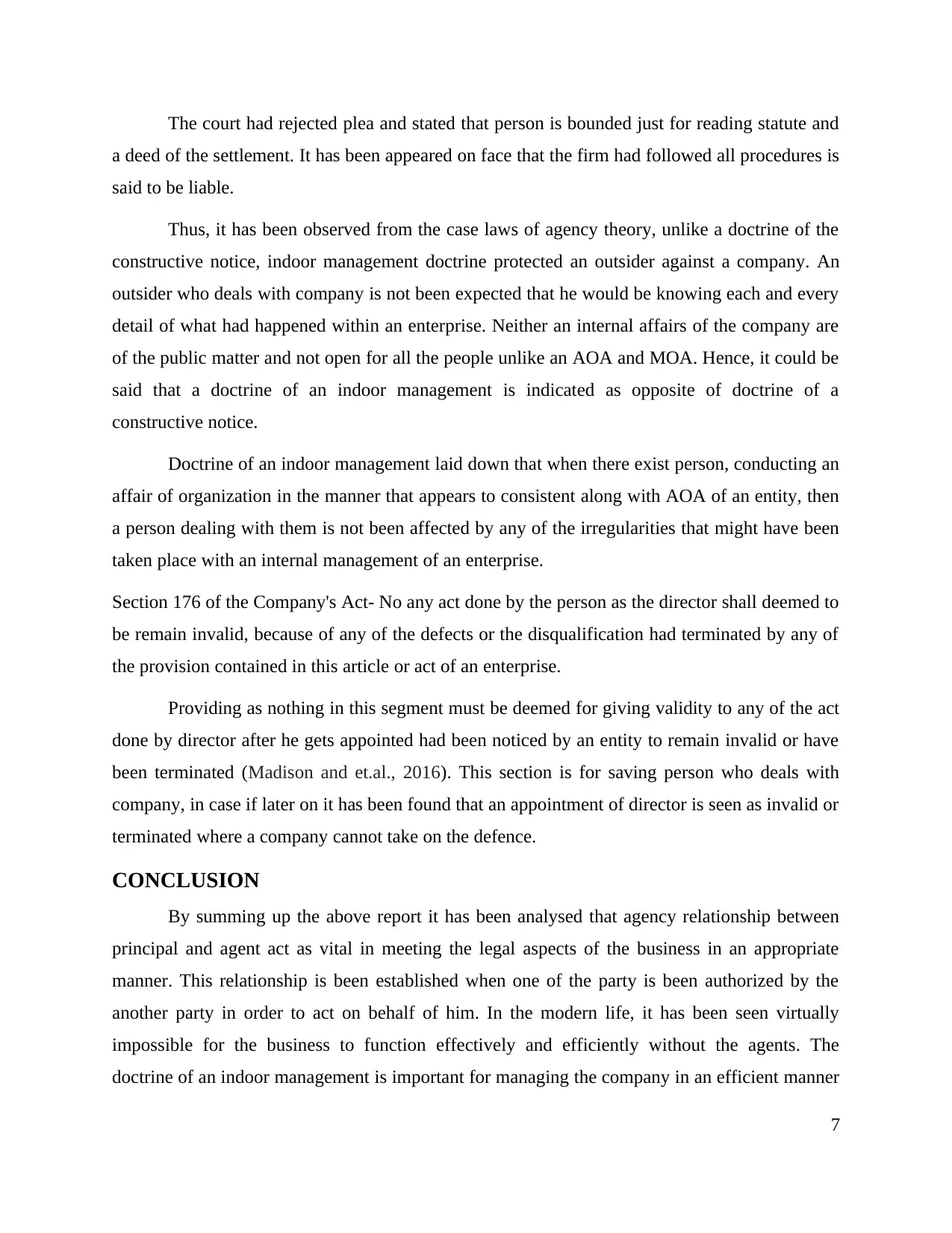
The court had rejected plea and stated that person is bounded just for reading statute and
a deed of the settlement. It has been appeared on face that the firm had followed all procedures is
said to be liable.
Thus, it has been observed from the case laws of agency theory, unlike a doctrine of the
constructive notice, indoor management doctrine protected an outsider against a company. An
outsider who deals with company is not been expected that he would be knowing each and every
detail of what had happened within an enterprise. Neither an internal affairs of the company are
of the public matter and not open for all the people unlike an AOA and MOA. Hence, it could be
said that a doctrine of an indoor management is indicated as opposite of doctrine of a
constructive notice.
Doctrine of an indoor management laid down that when there exist person, conducting an
affair of organization in the manner that appears to consistent along with AOA of an entity, then
a person dealing with them is not been affected by any of the irregularities that might have been
taken place with an internal management of an enterprise.
Section 176 of the Company's Act- No any act done by the person as the director shall deemed to
be remain invalid, because of any of the defects or the disqualification had terminated by any of
the provision contained in this article or act of an enterprise.
Providing as nothing in this segment must be deemed for giving validity to any of the act
done by director after he gets appointed had been noticed by an entity to remain invalid or have
been terminated (Madison and et.al., 2016). This section is for saving person who deals with
company, in case if later on it has been found that an appointment of director is seen as invalid or
terminated where a company cannot take on the defence.
CONCLUSION
By summing up the above report it has been analysed that agency relationship between
principal and agent act as vital in meeting the legal aspects of the business in an appropriate
manner. This relationship is been established when one of the party is been authorized by the
another party in order to act on behalf of him. In the modern life, it has been seen virtually
impossible for the business to function effectively and efficiently without the agents. The
doctrine of an indoor management is important for managing the company in an efficient manner
7
a deed of the settlement. It has been appeared on face that the firm had followed all procedures is
said to be liable.
Thus, it has been observed from the case laws of agency theory, unlike a doctrine of the
constructive notice, indoor management doctrine protected an outsider against a company. An
outsider who deals with company is not been expected that he would be knowing each and every
detail of what had happened within an enterprise. Neither an internal affairs of the company are
of the public matter and not open for all the people unlike an AOA and MOA. Hence, it could be
said that a doctrine of an indoor management is indicated as opposite of doctrine of a
constructive notice.
Doctrine of an indoor management laid down that when there exist person, conducting an
affair of organization in the manner that appears to consistent along with AOA of an entity, then
a person dealing with them is not been affected by any of the irregularities that might have been
taken place with an internal management of an enterprise.
Section 176 of the Company's Act- No any act done by the person as the director shall deemed to
be remain invalid, because of any of the defects or the disqualification had terminated by any of
the provision contained in this article or act of an enterprise.
Providing as nothing in this segment must be deemed for giving validity to any of the act
done by director after he gets appointed had been noticed by an entity to remain invalid or have
been terminated (Madison and et.al., 2016). This section is for saving person who deals with
company, in case if later on it has been found that an appointment of director is seen as invalid or
terminated where a company cannot take on the defence.
CONCLUSION
By summing up the above report it has been analysed that agency relationship between
principal and agent act as vital in meeting the legal aspects of the business in an appropriate
manner. This relationship is been established when one of the party is been authorized by the
another party in order to act on behalf of him. In the modern life, it has been seen virtually
impossible for the business to function effectively and efficiently without the agents. The
doctrine of an indoor management is important for managing the company in an efficient manner
7
⊘ This is a preview!⊘
Do you want full access?
Subscribe today to unlock all pages.

Trusted by 1+ million students worldwide

as it is not possible for all of the outsiders who are been dealing with an entity to look into an
internal state or affairs of the firm. Thus, it saves an outsiders in case there present a
mismanagement in company affairs and in protecting from any of the torts or fraud that is been
intended by the management.
8
internal state or affairs of the firm. Thus, it saves an outsiders in case there present a
mismanagement in company affairs and in protecting from any of the torts or fraud that is been
intended by the management.
8
Paraphrase This Document
Need a fresh take? Get an instant paraphrase of this document with our AI Paraphraser
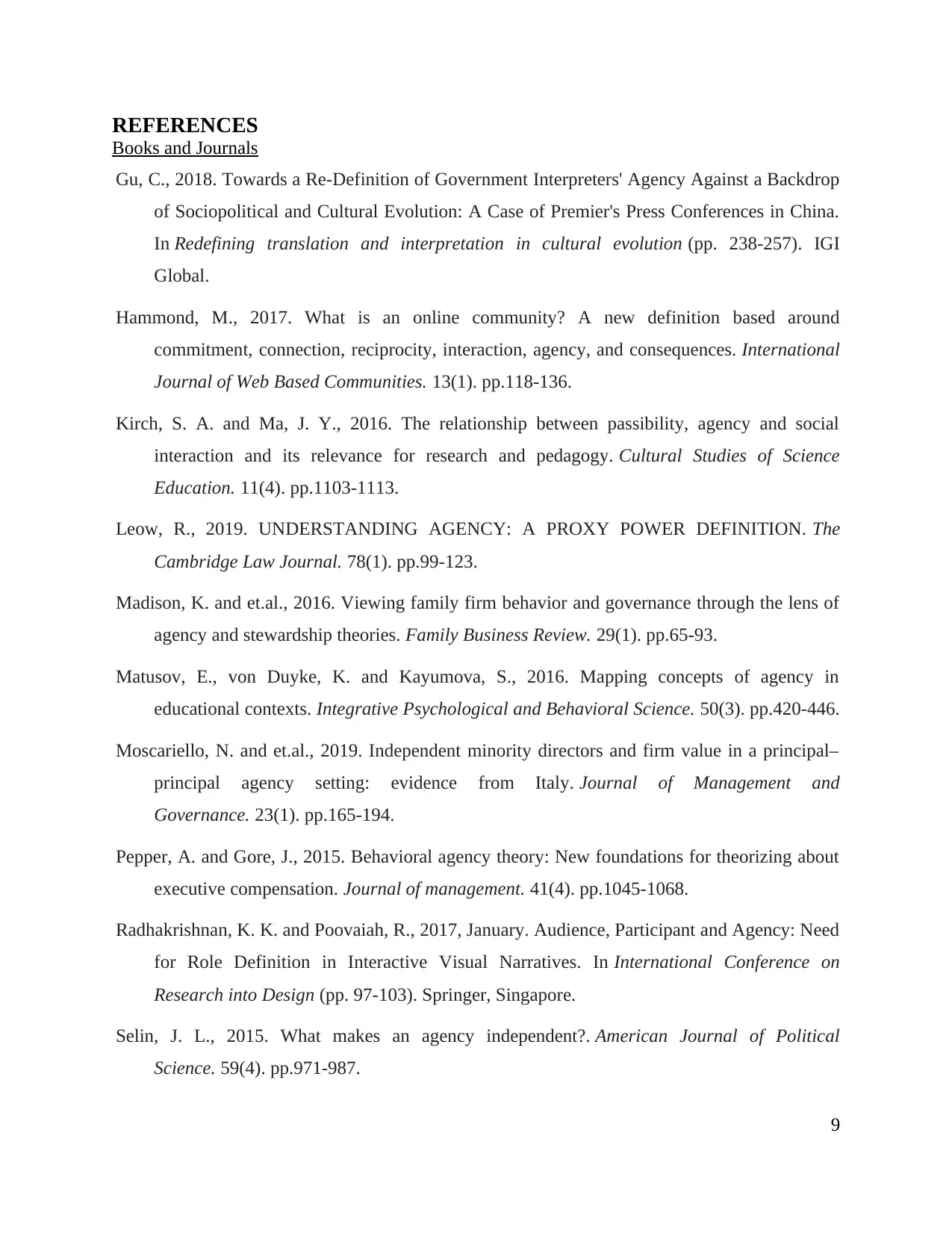
REFERENCES
Books and Journals
Gu, C., 2018. Towards a Re-Definition of Government Interpreters' Agency Against a Backdrop
of Sociopolitical and Cultural Evolution: A Case of Premier's Press Conferences in China.
In Redefining translation and interpretation in cultural evolution (pp. 238-257). IGI
Global.
Hammond, M., 2017. What is an online community? A new definition based around
commitment, connection, reciprocity, interaction, agency, and consequences. International
Journal of Web Based Communities. 13(1). pp.118-136.
Kirch, S. A. and Ma, J. Y., 2016. The relationship between passibility, agency and social
interaction and its relevance for research and pedagogy. Cultural Studies of Science
Education. 11(4). pp.1103-1113.
Leow, R., 2019. UNDERSTANDING AGENCY: A PROXY POWER DEFINITION. The
Cambridge Law Journal. 78(1). pp.99-123.
Madison, K. and et.al., 2016. Viewing family firm behavior and governance through the lens of
agency and stewardship theories. Family Business Review. 29(1). pp.65-93.
Matusov, E., von Duyke, K. and Kayumova, S., 2016. Mapping concepts of agency in
educational contexts. Integrative Psychological and Behavioral Science. 50(3). pp.420-446.
Moscariello, N. and et.al., 2019. Independent minority directors and firm value in a principal–
principal agency setting: evidence from Italy. Journal of Management and
Governance. 23(1). pp.165-194.
Pepper, A. and Gore, J., 2015. Behavioral agency theory: New foundations for theorizing about
executive compensation. Journal of management. 41(4). pp.1045-1068.
Radhakrishnan, K. K. and Poovaiah, R., 2017, January. Audience, Participant and Agency: Need
for Role Definition in Interactive Visual Narratives. In International Conference on
Research into Design (pp. 97-103). Springer, Singapore.
Selin, J. L., 2015. What makes an agency independent?. American Journal of Political
Science. 59(4). pp.971-987.
9
Books and Journals
Gu, C., 2018. Towards a Re-Definition of Government Interpreters' Agency Against a Backdrop
of Sociopolitical and Cultural Evolution: A Case of Premier's Press Conferences in China.
In Redefining translation and interpretation in cultural evolution (pp. 238-257). IGI
Global.
Hammond, M., 2017. What is an online community? A new definition based around
commitment, connection, reciprocity, interaction, agency, and consequences. International
Journal of Web Based Communities. 13(1). pp.118-136.
Kirch, S. A. and Ma, J. Y., 2016. The relationship between passibility, agency and social
interaction and its relevance for research and pedagogy. Cultural Studies of Science
Education. 11(4). pp.1103-1113.
Leow, R., 2019. UNDERSTANDING AGENCY: A PROXY POWER DEFINITION. The
Cambridge Law Journal. 78(1). pp.99-123.
Madison, K. and et.al., 2016. Viewing family firm behavior and governance through the lens of
agency and stewardship theories. Family Business Review. 29(1). pp.65-93.
Matusov, E., von Duyke, K. and Kayumova, S., 2016. Mapping concepts of agency in
educational contexts. Integrative Psychological and Behavioral Science. 50(3). pp.420-446.
Moscariello, N. and et.al., 2019. Independent minority directors and firm value in a principal–
principal agency setting: evidence from Italy. Journal of Management and
Governance. 23(1). pp.165-194.
Pepper, A. and Gore, J., 2015. Behavioral agency theory: New foundations for theorizing about
executive compensation. Journal of management. 41(4). pp.1045-1068.
Radhakrishnan, K. K. and Poovaiah, R., 2017, January. Audience, Participant and Agency: Need
for Role Definition in Interactive Visual Narratives. In International Conference on
Research into Design (pp. 97-103). Springer, Singapore.
Selin, J. L., 2015. What makes an agency independent?. American Journal of Political
Science. 59(4). pp.971-987.
9

Shogren, K. A., Wehmeyer, M. L. and Palmer, S. B., 2017. Causal agency theory.
In Development of self-determination through the life-course (pp. 55-67). Springer,
Dordrecht.
10
In Development of self-determination through the life-course (pp. 55-67). Springer,
Dordrecht.
10
⊘ This is a preview!⊘
Do you want full access?
Subscribe today to unlock all pages.

Trusted by 1+ million students worldwide
1 out of 12
Related Documents
Your All-in-One AI-Powered Toolkit for Academic Success.
+13062052269
info@desklib.com
Available 24*7 on WhatsApp / Email
![[object Object]](/_next/static/media/star-bottom.7253800d.svg)
Unlock your academic potential
Copyright © 2020–2026 A2Z Services. All Rights Reserved. Developed and managed by ZUCOL.



